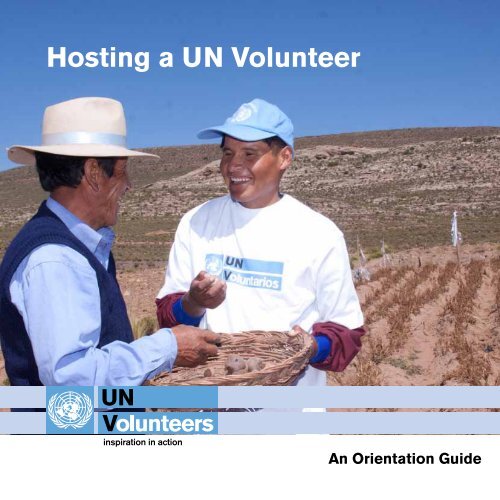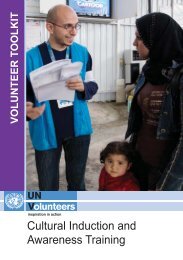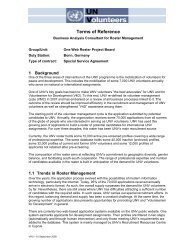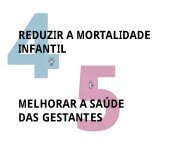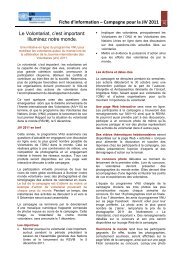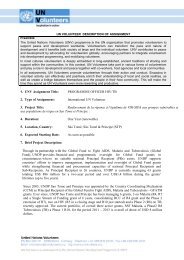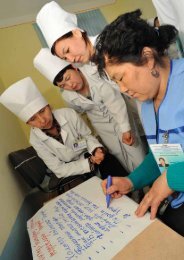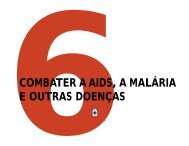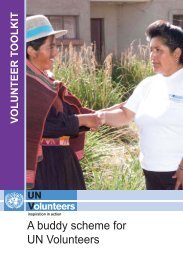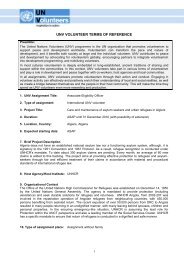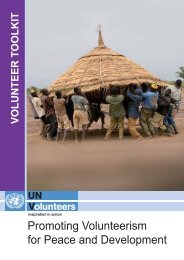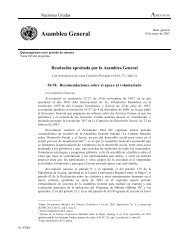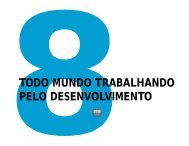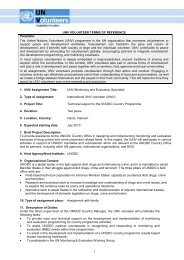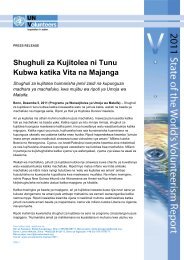Hosting a UN Volunteer - United Nations Volunteers
Hosting a UN Volunteer - United Nations Volunteers
Hosting a UN Volunteer - United Nations Volunteers
Create successful ePaper yourself
Turn your PDF publications into a flip-book with our unique Google optimized e-Paper software.
m / A4 Vertical / tagline / CMYK<br />
d<br />
<strong>Hosting</strong> a <strong>UN</strong> <strong>Volunteer</strong><br />
inspiration in action<br />
An Orientation Guide
2<br />
“The difference <strong>UN</strong>V makes is by demonstrating peace and<br />
development results and impact through volunteerism. <strong>UN</strong>V’s<br />
comparative advantage is the ability and knowledge to<br />
bring about transformational change through volunteerism,<br />
community voluntary action and civic engagement through active<br />
partnerships with civil society, volunteer involving organizations,<br />
<strong>UN</strong> agencies and Governments. This is inspiration in action.”<br />
Flavia Pansieri, Executive Coordinator,<br />
<strong>United</strong> <strong>Nations</strong> <strong>Volunteer</strong>s (<strong>UN</strong>V) programme<br />
Front cover: National <strong>UN</strong> <strong>Volunteer</strong> Teófilo Quispe (right)<br />
is a Technical Assistant and potato producer in Bolivia.<br />
Teófilo trains members of Corque municipality, such as the<br />
indigenous community leader shown here, in ways to improve<br />
production and income. (Nicolas Josserand, 2010)<br />
This water enclosure in Saru (Hinjilicut block) was completed in 2009 at the request of the<br />
villagers themselves. It is used as a fish farm for small business development, not to mention its<br />
usefulness as a water storage facility for washing and other activities. Many of the people here<br />
belong to India’s ‘Scheduled Tribes’. The women of Saru joined together in this voluntary self-help<br />
group to help each other generate income and press for development projects such as the water<br />
tank. (Philip Sen/<strong>UN</strong>V, 2009)
Table of contents<br />
4<br />
1. About us: <strong>United</strong> <strong>Nations</strong> <strong>Volunteer</strong>s (<strong>UN</strong>V) programme .................................................................7<br />
a. Purpose of the orientation guide .......................................................................................................7<br />
b. <strong>UN</strong>V: our mandate, our inspiration, our goal and how we achieve it ..................................................7<br />
Fast facts ................................................................................................................................................9<br />
2. How does volunteerism contribute to peace and development? ..................................................11<br />
3. Why host a <strong>UN</strong> <strong>Volunteer</strong>? Why include volunteerism in your programming? ............................. 14<br />
a. Because volunteerism helps you meet your peace and development goals ................................... 14<br />
b. Because of the people ................................................................................................................... 15<br />
c. Because of the services <strong>UN</strong>V offers you ....................................................................................... 15<br />
d. Because of the concrete support we provide you in the field ......................................................... 15<br />
4. What types of volunteers are supported by <strong>UN</strong>V? ..........................................................................17<br />
a. International <strong>UN</strong> <strong>Volunteer</strong>s ........................................................................................................... 17<br />
i. International <strong>UN</strong> <strong>Volunteer</strong>s ..................................................................................................... 17<br />
ii. <strong>UN</strong> <strong>Volunteer</strong> Interns ................................................................................................................ 17<br />
iii. Transfer of Knowledge Through Expatriate Nationals (TOKTEN) ............................................. 18<br />
b. National <strong>UN</strong> <strong>Volunteer</strong>s ................................................................................................................. 18<br />
i. National <strong>UN</strong> <strong>Volunteer</strong>s ............................................................................................................ 18<br />
ii. National <strong>UN</strong> Community <strong>Volunteer</strong>s ......................................................................................... 18<br />
5. What other types of volunteer modalities are offered by <strong>UN</strong>V? ................................................... 20<br />
a. <strong>UN</strong> Online <strong>Volunteer</strong>s .................................................................................................................... 20<br />
How to recruit a <strong>UN</strong> Online <strong>Volunteer</strong> ............................................................................................ 20<br />
b. Corporate/Private Sector <strong>Volunteer</strong>s ............................................................................................. 21<br />
c. <strong>UN</strong> University <strong>Volunteer</strong>s ............................................................................................................... 21<br />
6. What are the <strong>UN</strong> <strong>Volunteer</strong>’s assignment parameters? ................................................................. 23
7. What are the roles and responsibilities of <strong>UN</strong> <strong>Volunteer</strong>s? ........................................................... 25<br />
a. Pre-assignment.............................................................................................................................. 26<br />
b. During the assignment ................................................................................................................... 26<br />
c. End of assignment ......................................................................................................................... 26<br />
8. What is your responsibility in managing a <strong>UN</strong> <strong>Volunteer</strong>? ..............................................................27<br />
a. Pre-assignment.............................................................................................................................. 27<br />
b. During the assignment ................................................................................................................... 28<br />
c. End of assignment ......................................................................................................................... 28<br />
9. What are the costs of hosting a <strong>UN</strong> <strong>Volunteer</strong>? .............................................................................. 30<br />
10. What legal and operational frameworks are involved? .................................................................. 31<br />
11. How do you request a <strong>UN</strong> <strong>Volunteer</strong>? ............................................................................................. 32<br />
a. Recruiting international <strong>UN</strong> <strong>Volunteer</strong>s .......................................................................................... 32<br />
b. Recruiting national <strong>UN</strong> <strong>Volunteer</strong>s ................................................................................................. 33<br />
c. Locally identified candidates .......................................................................................................... 34<br />
12. Examples of <strong>UN</strong> <strong>Volunteer</strong>s helping host entities to meet their goals ......................................... 35<br />
a. Africa ............................................................................................................................................ 36<br />
b. Asia Pacific .................................................................................................................................... 38<br />
c. Arab States .................................................................................................................................... 41<br />
d. Europe and Commonwealth of Independent States ....................................................................... 43<br />
e. Latin America and the Caribbean ................................................................................................... 46<br />
<strong>UN</strong> Online <strong>Volunteer</strong>s .......................................................................................................................... 49<br />
5
About us
1. About us – <strong>United</strong> <strong>Nations</strong><br />
<strong>Volunteer</strong>s (<strong>UN</strong>V) programme<br />
a) Purpose of the orientation guide<br />
The purpose of this orientation guide is to both inform and inspire partner organizations who wish to harness<br />
the power of volunteerism to achieve their peace and development objectives by hosting <strong>UN</strong> <strong>Volunteer</strong>s<br />
within the context of their programmes, projects and field operations. This guide serves to provide basic<br />
information on the mission and goals of <strong>UN</strong>V and the areas of our programmatic outreach, including the<br />
different types of <strong>UN</strong> <strong>Volunteer</strong>s. It provides basic information about how host entities can partner with <strong>UN</strong>V<br />
and integrate elements of volunteerism and <strong>UN</strong> <strong>Volunteer</strong>s into their own programmes. It also describes<br />
partner organizations’ responsibilities towards volunteers.<br />
b) <strong>United</strong> <strong>Nations</strong> <strong>Volunteer</strong>s (<strong>UN</strong>V) programme: our mandate, our inspiration,<br />
our goal and how we achieve it<br />
Our mandate<br />
On 7 December 1970 the <strong>United</strong> <strong>Nations</strong> General Assembly (GA) passed resolution 26/59 which set up<br />
“...with effect from 1 January 1971 an international group of volunteers, the members of which shall be<br />
designated collectively and individually as <strong>United</strong> <strong>Nations</strong> <strong>Volunteer</strong>s”.<br />
The mandate of <strong>UN</strong>V, which has been evolving continuously since its establishment in 1970, today positions<br />
the organization as the leader within the <strong>United</strong> <strong>Nations</strong> (<strong>UN</strong>) system in recruiting and mobilizing volunteers<br />
in response to partner requests for technical assistance. Furthermore, it has assisted programme countries<br />
in building sustainable national capacities, mobilizing volunteers domestically through national volunteer<br />
schemes, volunteer centres and networks, as well as promoting social inclusion and the involvement of youth<br />
in volunteerism for peace and development.<br />
Estefania Afuirre Chauvinia is a national <strong>UN</strong> <strong>Volunteer</strong> Protection Assistant with <strong>UN</strong>HCR in her<br />
home country, Ecuador. At the San Lorenzo refugee registration centre, people often arrive from<br />
across the Colombian border with almost nothing and have to start a new life. Registering them and<br />
listening to their needs is a crucial task in order to deliver further assistance. (Andrew Smith, 2009)<br />
7
8<br />
In 1976, the <strong>UN</strong> General Assembly (GA) resolution 31/131 broadened the mandate of <strong>UN</strong>V to promoting the<br />
advancement of the role of youth in development. <strong>UN</strong> GA resolution 56/38 further expanded the mandate by<br />
proclaiming 2001 the International Year of <strong>Volunteer</strong>s (IYV). This resolution also designated <strong>UN</strong>V as the <strong>UN</strong><br />
focal point to raise awareness of volunteerism and provide technical cooperation to developing countries in<br />
the field of volunteerism. This was to enable developing countries to fully exploit volunteerism’s potential as a<br />
resource for achieving the Millennium Development Goals (MDGs).<br />
Our inspiration<br />
<strong>UN</strong>V is inspired by the conviction that volunteerism can transform the pace and nature of development and by<br />
the idea that everyone can contribute their time and energy towards peace and development. With partners,<br />
<strong>UN</strong>V advocates for volunteerism, integrates volunteerism into development planning and mobilizes volunteers.<br />
The enormous potential of volunteerism is an inspiration to <strong>UN</strong>V and to volunteers around the world.<br />
Our goal<br />
At <strong>UN</strong>V, our goal is to contribute to peace and human development by helping volunteerism become an<br />
integral part of every peace and human development agenda, whether it is for an international, regional,<br />
national or local endeavour.<br />
How we achieve our goal<br />
i. <strong>UN</strong>V advocates globally for volunteerism for peace and development;<br />
ii. <strong>UN</strong>V works with partners like you to integrate volunteerism as an intentional component<br />
of your peace and development programming;<br />
iii. <strong>UN</strong>V mobilizes volunteers to contribute to global peace and development.<br />
For more details, go to http://www.unv.org or http://www.worldvolunteerweb.org.<br />
Photo left: Jean-Claude Bakaira, <strong>UN</strong>V<br />
Camp Manager (left), and Rosario Dela<br />
Cruz, <strong>UN</strong>V Administrative Officer (centre),<br />
engage with a volunteer supporting the<br />
elections in Kindu, Democratic Republic<br />
of Congo. (<strong>UN</strong>V, 2006) Photo right: <strong>UN</strong>V<br />
Electoral Officers and Advisors supporting<br />
the 2012 electoral process in Timor Leste<br />
continue the example set by the <strong>UN</strong><br />
<strong>Volunteer</strong>s who assisted in the country’s<br />
1999 elections. (<strong>UN</strong>V, 1999)
• The <strong>United</strong> <strong>Nations</strong> <strong>Volunteer</strong>s (<strong>UN</strong>V) programme was created by the <strong>United</strong> <strong>Nations</strong> General Assembly<br />
in 1970 with the mandate to support the work of all <strong>UN</strong> organizations, including <strong>UN</strong> specialized agencies and<br />
<strong>UN</strong> peacekeeping and political missions.<br />
• <strong>UN</strong>V partnered with 23 <strong>UN</strong> entities and 16 <strong>UN</strong> missions in 2010, and supported the <strong>UN</strong> reform process<br />
by mainstreaming volunteerism into 57 <strong>United</strong> <strong>Nations</strong> Development Assistance Frameworks (<strong>UN</strong>DAFs) and<br />
supporting <strong>UN</strong> Resident Coordinators, including in the eight “Delivering as One” pilot countries.<br />
• The <strong>UN</strong> entities which engaged the most <strong>UN</strong> <strong>Volunteer</strong>s in 2010 were the <strong>United</strong> <strong>Nations</strong> Department<br />
of Peace Keeping Operations (DPKO) (3,164 or 41 per cent), <strong>United</strong> <strong>Nations</strong> Development Programme<br />
(<strong>UN</strong>DP) (2,233 or 29 per cent), and <strong>United</strong> <strong>Nations</strong> High Commissioner for Refugees (<strong>UN</strong>HCR) (1,010 or<br />
13 per cent).<br />
• <strong>UN</strong> <strong>Volunteer</strong>s comprise around 30 per cent of the <strong>UN</strong>’s international civilian peacekeeping<br />
personnel, contributing an array of expertise ranging from peacebuilding and reconciliation to medical care,<br />
humanitarian relief, infrastructure repair and housing for victims of civil strife and natural disasters.<br />
• <strong>UN</strong> <strong>Volunteer</strong>s constitute 17 per cent of the <strong>UN</strong>HCR field presence in 74 countries.<br />
• Since 1971, <strong>UN</strong>V has mobilized tens of thousands of skilled professionals to serve the cause of<br />
peace and development.<br />
• Since <strong>UN</strong>V’s first involvement with peacekeeping and political missions, with its support to the<br />
Cambodia peace process in 1992, more than 20,000 <strong>UN</strong> <strong>Volunteer</strong>s have served in over 60 <strong>UN</strong> missions of<br />
this kind. Other milestone missions include the peace processes in South Africa, Mozambique, Kosovo, Timor<br />
Leste and South Sudan.<br />
• Every year, <strong>UN</strong>V directly mobilizes <strong>UN</strong> <strong>Volunteer</strong>s to fill more than 7,500 national and international<br />
assignments.<br />
• <strong>UN</strong> <strong>Volunteer</strong>s represent over 150 nationalities and volunteer their services in more than 130 countries.<br />
• More than 75 per cent of <strong>UN</strong> <strong>Volunteer</strong>s come from developing countries and volunteer in the South,<br />
thus promoting South-South cooperation, and more than 30 per cent volunteer within their own countries.<br />
• <strong>UN</strong>V, headed by an Executive Coordinator, has about 150 staff members based in Bonn and small<br />
field presences in close to 100 countries.<br />
• <strong>UN</strong>V is administered by <strong>UN</strong>DP.<br />
Fast facts<br />
9
<strong>Volunteer</strong>ism’s contribution<br />
10
2. How does volunteerism<br />
contribute to peace and development?<br />
The difference <strong>UN</strong>V makes is by demonstrating peace and development results and impact through<br />
volunteerism. <strong>UN</strong>V’s comparative advantage is the ability and knowledge to bring about transformational<br />
change through volunteerism, community voluntary action and civic engagement through active partnerships<br />
with civil society, volunteer involving organizations, <strong>UN</strong> agencies and Governments. This is inspiration in action.<br />
<strong>UN</strong>V advocates for the integration of volunteerism into peace and development frameworks at the global,<br />
regional and national levels, and mobilizes <strong>UN</strong> <strong>Volunteer</strong>s.<br />
<strong>UN</strong>V intentionally focuses its efforts in specific priority and geographical areas where volunteerism, through<br />
deliberate and considered involvement, can affect transformational impact and change in the lives of<br />
communities – change that can be demonstrated through tangible and measureable results that ultimately<br />
contribute to global peace and development.<br />
<strong>UN</strong>V is guided by knowledge and lessons learnt in supporting ameliorative initiatives through volunteerism,<br />
community voluntary action and civic engagement. This includes best practices in community-centred,<br />
inclusive and participatory approaches to achieve peace and development outcomes. This in turn includes<br />
strengthening local capacities and facilitating access to services, opportunities and service delivery; and<br />
community mobilization through voluntary action. Additionally, <strong>UN</strong>V will continue to use its flexibility and<br />
ability to rapidly provide quality volunteers (through a number of different channels or modalities) to support<br />
a variety of different needs in the areas of peace and development.<br />
Through its programme framework, <strong>UN</strong>V focuses on harnessing volunteerism as a strategic asset and a<br />
powerful contributor to peace and development in the following five priority programme areas:<br />
In Ethiopia, local community youth volunteers prepare the land to improve<br />
production as part of income generating activities. (Antonio Fiorente, 2010)<br />
11
12<br />
Delivery of basic services<br />
• Strengthening local governance<br />
• Primary health care and HIV/AIDS<br />
• Non-formal education<br />
Environment and climate change<br />
• Community-based natural resource management and sustainable biodiversity conservation<br />
• Community-based adaptation to climate change<br />
• Food security through sustainable livelihoods<br />
Crisis prevention and recovery<br />
• Disaster prevention and risk reduction, as well as conflict prevention<br />
• Post-disaster and post-conflict recovery, including sustainable livelihoods and democratic governance<br />
(e.g. post-conflict electoral processes)<br />
• Local conflict resolution, reconciliation, peace-building and human rights<br />
Humanitarian assistance<br />
• Emergency response and early recovery, including basic services and food security<br />
• Protection, including of refugees, internally displaced persons (IDPs), returnees, children<br />
• Promotion of human rights<br />
• Support to coordination efforts and information, reporting and research<br />
Operational and capacity building support to <strong>UN</strong> Missions<br />
• Substantive and technical support to achieve <strong>UN</strong> peacekeeping and peace-building mandates<br />
• Capacity development and skills transfer to national stakeholders<br />
• Local institutional capacity building, including in democratic governance, transitional justice, rule of law,<br />
and civil affairs<br />
• Outreach to the community level to support <strong>UN</strong> peacekeeping and political missions’ credibility and<br />
sustainability of peace efforts.<br />
Social inclusion<br />
<strong>UN</strong>V support in its priority areas is underpinned by the three cross-cutting themes of youth, gender, and<br />
marginalized persons also defined as “social inclusion pillars”. At community and institutional levels, social<br />
inclusion involves relevant target groups in all volunteerism and related institutional initiatives.<br />
National <strong>UN</strong> <strong>Volunteer</strong> Rizwan Latif (right) is an Outreach and Capacity Development Officer in<br />
Islamabad, Pakistan. Here, he discusses with 23-year-old Ammar Ahmed how men and boys can be<br />
encouraged to reduce gender-based violence and promote gender equality. (Waqas Anees, 2010)
Why host a <strong>UN</strong> <strong>Volunteer</strong>?<br />
13
14<br />
3. Why host a <strong>UN</strong> <strong>Volunteer</strong>?<br />
Why include volunteerism in<br />
your programming?<br />
a) Because volunteerism helps you meet your peace and development goals<br />
The integration of volunteerism into peace and development programming and policies has long been<br />
recognized by many <strong>UN</strong> General Assembly resolutions and some <strong>UN</strong> instruments as an essential ingredient<br />
in achieving sustainable development. It is commonly accepted that the MDGs will be missed if development<br />
agencies fail to mobilize and involve millions of citizens to help enhance their development impact.<br />
<strong>Volunteer</strong>ism:<br />
i. Is untapped national wealth and a strategic resource for development<br />
ii. Increases the efficiency and outreach of development activities thus increasing communities’ trust in<br />
themselves and their government<br />
iii. Provides a platform for social inclusion, young, old, marginalized, women<br />
iv. Is an expression of citizenship and human rights<br />
v. Opens the shrinking development and democratic space<br />
vi. Mobilizes collective action to deal with problems and issues<br />
vii. Provides a safety net where traditional market responses fail to protect the powerless from despair,<br />
destitution, abuse and fear<br />
viii. Helps the poor to move from passive recipients to active participants in development and helps them<br />
to envision their own future and take action<br />
ix. Is enriching to the individual.
) Because of the people<br />
i. <strong>UN</strong> <strong>Volunteer</strong>s are highly motivated and inspirational, and are committed to the principles, ideals and<br />
code of conduct of the <strong>United</strong> <strong>Nations</strong><br />
ii. <strong>UN</strong> <strong>Volunteer</strong>s are experienced, qualified and talented people<br />
iii. <strong>UN</strong> <strong>Volunteer</strong>s bring the requisite professional credentials and a minimum of two to five years of<br />
relevant experience.<br />
c) Because of the services <strong>UN</strong>V offers you<br />
i. A database of 25,000 assessed candidates in over 100 programme categories<br />
ii. The legal framework through Conditions of Service, guidance notes and the <strong>UN</strong>V code of conduct for<br />
<strong>UN</strong> <strong>Volunteer</strong>s<br />
iii. Contracts between the <strong>UN</strong> <strong>Volunteer</strong>, host entity and <strong>UN</strong>V<br />
iv. Centralized volunteer living allowance payments to all its volunteers<br />
v. A <strong>UN</strong>V Online <strong>Volunteer</strong>ing service that matches skilled volunteers with opportunities to contribute to<br />
development online, rather than on site. In 2010, 10,000 online volunteers undertook 15,000 assignments<br />
vi. Programmatic, operations and knowledge management support<br />
vii. Field support comprising a <strong>UN</strong>V Field Unit usually led by a <strong>UN</strong>V Programme Officer operating from<br />
the <strong>UN</strong>DP Country Office. <strong>UN</strong>V field support to <strong>UN</strong> peacekeeping or special political missions is<br />
headed by a <strong>UN</strong>V Programme Manager who is integrated into the mission. Where no Field Unit<br />
exists, field support for <strong>UN</strong> <strong>Volunteer</strong>s is provided by a <strong>UN</strong>DP Country Office focal point who liaises<br />
with <strong>UN</strong>V Headquarters on programmatic, operational and administrative matters.<br />
d) Because of the concrete support we provide you in the field<br />
<strong>UN</strong>V can help you identify programmatic opportunities for volunteer assignments and supports you in:<br />
i. Drafting the Description of Assignment (DOA)<br />
ii. Managing the selection process<br />
iii. Conducting the initial briefing<br />
iv. Monitoring the <strong>UN</strong> <strong>Volunteer</strong> during the assignment<br />
v. Facilitating opportunities to increase the visibility of the contribution of volunteerism for development,<br />
including developing innovative programmes, projects and initiatives.<br />
15
Types of volunteers<br />
16
4. What types of volunteers<br />
are supported by <strong>UN</strong>V?<br />
a) International <strong>UN</strong> <strong>Volunteer</strong>s:<br />
i. International <strong>UN</strong> <strong>Volunteer</strong>s<br />
International <strong>UN</strong> <strong>Volunteer</strong>s serve in countries other than their own. They are recruited for their technical<br />
expertise and specialized inputs to development programmes and in the areas of peacekeeping,<br />
humanitarian assistance and <strong>UN</strong>-supported electoral processes. The average age of international <strong>UN</strong><br />
<strong>Volunteer</strong>s is 39 years. They have the requisite professional skills and qualifications for their assignment<br />
and bring a minimum of two to five years of relevant experience. The majority – 77 per cent – come from<br />
developing countries themselves. The duration of their assignments can be from 6 to 24 months with pro<br />
forma costs per year ranging from 45,000 to 91,000 USD 1 .<br />
ii. <strong>UN</strong> <strong>Volunteer</strong> Interns 2<br />
<strong>UN</strong> <strong>Volunteer</strong> Interns are recent university graduates up to 27 years old. The objective of the <strong>UN</strong>V<br />
Internship Programme is to provide them with the opportunities to volunteer in their respective fields of<br />
specialization. This exposes them to development realities in international socio-economic and political<br />
environments which in turn enhances their professional and life skills. <strong>UN</strong> <strong>Volunteer</strong> Interns are fully funded<br />
by donors.<br />
1 Pro forma costs are determined by country and vary due to differences in the costs of living, country-specific security and other<br />
requirements. Figures accurate at time of printing.<br />
2 The <strong>UN</strong>V Internship programme is currently under review and a name change may follow.<br />
Zoran Vasiljevic (left) is a national <strong>UN</strong> <strong>Volunteer</strong> from the Roma community in Croatia. As<br />
part of a <strong>UN</strong>DP partnership with local authorities, he leads children in after-school learning<br />
and socializing activities at the Capraske Poljana Community Centre at a Roma settlement.<br />
These activities are aimed at strengthening social cohesion and promoting the inclusion of<br />
marginalized and vulnerable groups through volunteerism. (Hrvoje Žucko, 2009)<br />
17
18<br />
iii. Transfer of Knowledge through Expatriate Nationals (TOKTEN)<br />
Transfer of Knowledge Through Expatriate Nationals (TOKTEN) specialists or “diaspora volunteers”<br />
provide primarily short-term advisory services in projects addressing priority areas identified by the host<br />
Governments. As expatriate nationals, the volunteers’ intimate understanding of the host country frequently<br />
results in the identification of special needs that might otherwise have been ignored. Their cultural and<br />
linguistic skills facilitate local capacity development and pave the way for longer term relationships. Diaspora<br />
<strong>UN</strong> <strong>Volunteer</strong>s are identified from <strong>UN</strong>V and <strong>UN</strong>DP databases and matched with the country’s needs.<br />
b) National <strong>UN</strong> <strong>Volunteer</strong>s:<br />
i. National <strong>UN</strong> <strong>Volunteer</strong>s<br />
National <strong>UN</strong> <strong>Volunteer</strong>s serve in their own countries and support national capacity building initiatives. They<br />
facilitate local networking and the exchange of information. The recruitment of national <strong>UN</strong> <strong>Volunteer</strong>s is<br />
managed at country level with guidance from <strong>UN</strong>V Headquarters. The assignment duration ranges from<br />
3 to 24 months with an average pro forma cost of 12,000 USD per year.<br />
National <strong>UN</strong> <strong>Volunteer</strong>s must be at least 25 years old and hold the academic or technical credentials<br />
required for the relevant assignment. In certain professions, practical experience may substitute for<br />
academic prerequisites. National <strong>UN</strong> <strong>Volunteer</strong>s must have two to five years of relevant working experience.<br />
ii. National <strong>UN</strong> Community <strong>Volunteer</strong>s 3<br />
National <strong>UN</strong> community <strong>Volunteer</strong>s must be at least 21 years old and have a basic education such as<br />
a secondary school certificate, baccalauréat or equivalent. These volunteers bring technical skills in a<br />
profession or trade for which they have the related diploma and a minimum of two years of relevant working<br />
experience. The national <strong>UN</strong> community <strong>Volunteer</strong>s also bring skills in community development and social<br />
mobilization.<br />
3 Formerly known as national <strong>UN</strong>V field workers.<br />
National <strong>UN</strong> <strong>Volunteer</strong> Javier Maraza Ayca (right) supports achievement of the Millennium<br />
Development Goals through a community tourism project in the economically deprived Qaqachaca<br />
municipality of Oruro, Bolivia. Being indigenous to the area, and understanding the local language and<br />
culture, Javier is perfectly placed to live and work within the community. (Nicolas Josserand, 2010)
Other <strong>UN</strong>V modalities<br />
19
20<br />
5. What other types of volunteer<br />
modalities are offered by <strong>UN</strong>V?<br />
a) <strong>UN</strong> Online <strong>Volunteer</strong>s<br />
The <strong>UN</strong>V Online <strong>Volunteer</strong>ing service connects non-profit organizations – such as non-governmental<br />
organizations, Governments and <strong>United</strong> <strong>Nations</strong> entities – with volunteers worldwide so they can collaborate<br />
online for peace and development. The <strong>UN</strong> Online <strong>Volunteer</strong>s are not <strong>UN</strong> <strong>Volunteer</strong>s and are not covered by<br />
any contract with <strong>UN</strong>V. They are students, working professionals and retirees with diverse backgrounds and<br />
from across the globe who contribute their skills over the Internet to help organizations address peace and<br />
development challenges. <strong>UN</strong> Online <strong>Volunteer</strong>s have diverse backgrounds and cooperate across borders,<br />
without ever leaving their own homes. They do not receive financial compensation. They help develop<br />
capacity by training staff, teaching new skills or providing guidance and advice.<br />
How to recruit an online volunteer through the <strong>UN</strong>V Online <strong>Volunteer</strong>ing service:<br />
On www.onlinevolunteering.org, <strong>UN</strong>V provides a global platform for organizations to advertise their<br />
online volunteering opportunities. Organizations wishing to collaborate with <strong>UN</strong> Online <strong>Volunteer</strong>s<br />
log on to the website, register their details, and submit volunteer opportunity descriptions explaining<br />
what they need from online volunteers. The opportunity is then published on the service website.<br />
Tools to manage online volunteers are available on the website, where you can find out about<br />
experiences, best practices and lessons learned from organizations and volunteers worldwide. Many<br />
non-governmental organizations, Governments and <strong>United</strong> <strong>Nations</strong> agencies recognize the value of<br />
online volunteering.<br />
For more information, see www.onlinevolunteering.org.
) <strong>UN</strong> Corporate/Private Sector <strong>Volunteer</strong>s<br />
Under the <strong>UN</strong>V Corporate/Private Sector (CPS) programme, current or retired employees from the private<br />
sector provide short-term advisory services. They support <strong>UN</strong> projects and initiatives in achieving the<br />
Millennium Development Goals (MDGs) with a particular focus on business development in programme<br />
countries. Through the host entity, these volunteers advise a variety of organizations, such as small and<br />
medium enterprises, associations of enterprises or local NGOs, as well as governmental institutions such as<br />
ministries of commerce, industry and tourism.<br />
c) <strong>UN</strong> University <strong>Volunteer</strong>s<br />
Through its partnership with universities, <strong>UN</strong>V provides qualified <strong>UN</strong> University <strong>Volunteer</strong>s from partner<br />
universities. These volunteers, who are recent graduates and typically range from 22 to 25 years old, serve<br />
for six months in developing countries. They work towards achieving the MDGs in selected areas of youth,<br />
education, health, environment, and information and communication technologies for development with a<br />
relevant youth component.<br />
<strong>UN</strong> <strong>Volunteer</strong> Field Officers with the<br />
Sri Lankan Human Right Commission,<br />
from left to right, Mohamed Fahmi<br />
(Sri Lanka), Jessica Skinner (UK/<br />
Australia) and Sivaguru Thanigaseelan<br />
(Sri Lanka) prepare a tsunami disaster<br />
risk prevention workshop for local<br />
community members. (<strong>UN</strong>V, 2007)<br />
21
Assignment parameters<br />
22
6. What are the <strong>UN</strong> <strong>Volunteer</strong>’s<br />
assignment parameters?<br />
<strong>UN</strong>V has developed a set of principles and guidelines called <strong>UN</strong> <strong>Volunteer</strong> Assignment Parameters. These<br />
parameters are designed to ensure that volunteer assignments are consistent with the mandate, policies<br />
and guidelines of <strong>UN</strong>V as well as reflect the values and principles of volunteerism. The parameters are also<br />
there to ensure that volunteerism is adequately reflected in the assignments. As the host entity, you provide<br />
a unique opportunity for <strong>UN</strong> <strong>Volunteer</strong>s to develop their own professional and personal skills as well as<br />
reinforce their commitment to volunteerism for peace and development.<br />
Key <strong>UN</strong> <strong>Volunteer</strong> assignment parameters for the host entity:<br />
a) The host entity must provide Descriptions of Assignment (DOA) outlining tasks, responsibilities and the<br />
nature of work to be carried out that is clearly suited to be carried out by volunteers. For example, the<br />
DOA must:<br />
i. Not be identical to existing staff functions;<br />
ii. Contain a unique “volunteerism for peace and development” component not found in <strong>UN</strong> staff job<br />
descriptions;<br />
iii. Include a difference (at least 25 per cent or more of the assignment) between the <strong>UN</strong> <strong>Volunteer</strong><br />
assignment and existing staff functions to clearly differentiate the volunteer nature of the<br />
assignment;<br />
iv. Be as specific as possible;<br />
v. Not include fiduciary or procurement responsibilities.<br />
b) To express the volunteering nature of the assignments, the host entity should make provisions for the<br />
<strong>UN</strong> <strong>Volunteer</strong>, for at least part of the assignment to be engaged in capacity-building by transferring his/<br />
her knowledge and skills to local entities, communities and individuals to ensure sustainability.<br />
<strong>UN</strong> <strong>Volunteer</strong> Maïmounata Ouedraogo rides across Burkina Faso by motorbike with the National<br />
<strong>Volunteer</strong> Programme to sensitize people to the power of volunteerism. (K. Gosse/<strong>UN</strong>V, 2009)<br />
23
24<br />
c) The DOA must provide an opportunity to the <strong>UN</strong> <strong>Volunteer</strong> to promote and engage volunteering<br />
activities (e.g. developing volunteerism policies and schemes, civic sensitization, promotion of selfhelp,<br />
community mobilization and capacity development of civil society) and to take part in in-country<br />
volunteerism activities, including the celebration of International <strong>Volunteer</strong> Day (IVD);<br />
d) If mainstreaming volunteerism for peace and development into the DOA is not possible, the host entity<br />
must provide for the <strong>UN</strong> <strong>Volunteer</strong> to dedicate at least 10 per cent of the time covered by the DOA to<br />
promoting volunteerism for peace and development either in another internal Section/Unit or outside<br />
the host entity.<br />
This page: <strong>UN</strong>V Vehicle<br />
Technician Adama Aissatou<br />
Sherif runs a safety check at the<br />
transport section of the <strong>United</strong><br />
<strong>Nations</strong> Mission in the Central<br />
African Republic and Chad<br />
(MINURCAT) in N’Djamena, Chad.<br />
(Harald Franzen, 2009)<br />
In Honduras, the Joint Programme<br />
for the Support of Human<br />
Security, intends to reduce<br />
violence and improve the lives of<br />
youth. There, <strong>UN</strong> <strong>Volunteer</strong>s such<br />
as Alexis Sagastume (left), the<br />
programme’s coordinator, engage<br />
youth in community activities.<br />
(Andrew Smith, 2009)
7. What are the roles and<br />
responsibilities of <strong>UN</strong> <strong>Volunteer</strong>s?<br />
<strong>UN</strong> <strong>Volunteer</strong>s devote their knowledge and abilities to peace and development in accordance with the<br />
values of free will, commitment, engagement and solidarity, which are the foundations of volunteerism.<br />
During the entire course of their <strong>UN</strong>V assignment, all <strong>UN</strong> <strong>Volunteer</strong>s are required to abide by the Code of<br />
Conduct as set out in the <strong>UN</strong>V Conditions of Service.<br />
<strong>Volunteer</strong>s’ responsibilities<br />
25
26<br />
<strong>UN</strong> <strong>Volunteer</strong>s have certain responsibilities during the following phases of the assignment, including:<br />
a) Pre-assignment<br />
The <strong>UN</strong> <strong>Volunteer</strong>:<br />
i. Gets acquainted with the <strong>UN</strong> entity, <strong>UN</strong>V and its concept of volunteerism for peace and development;<br />
ii. Familiarizes him/herself with the Code of Conduct and the <strong>UN</strong>V Conditions of Service (COS);<br />
iii. Completes mandatory online security and ethics training; and<br />
iv. Completes all required medical and visa procedures.<br />
b) During the assignment<br />
The <strong>UN</strong> <strong>Volunteer</strong>:<br />
i. Shares expertise and knowledge by fulfilling his/her duties according to the Description of<br />
Assignment (DOA), contributing with his/her skills and technical competencies towards achieving<br />
peace and development goals;<br />
ii. Promotes volunteerism through acting as a facilitator and catalyst, increasing the understanding and<br />
appreciation of volunteerism among colleagues and with the host entity;<br />
iii. Reflects and learns by completing the initial and interim reports in <strong>UN</strong>V’s <strong>Volunteer</strong> Reporting<br />
System; and<br />
iv. Writes and shares stories and results of his/her volunteering experience.<br />
c) End of assignment<br />
The <strong>UN</strong> <strong>Volunteer</strong>:<br />
i. Completes the final report in the <strong>UN</strong>V <strong>Volunteer</strong> Reporting System;<br />
ii. Prepares handover notes and participates in debriefing with the supervisor; and<br />
iii. Shares stories and results from the <strong>UN</strong>V assignment.<br />
National <strong>UN</strong> community <strong>Volunteer</strong> Badria Ahmed Elhij (right), a support specialist on combating<br />
Female Genital Mutilation (FGM), distributed information, education and communication materials<br />
during a community discussion and FGM awareness training at Abu Seid Omdurman, Sudan.<br />
(Blazej Mikula, 2008)
8. What is your responsibility<br />
in managing a <strong>UN</strong> <strong>Volunteer</strong>?<br />
Host entities have responsibility for managing the <strong>UN</strong> <strong>Volunteer</strong> during the following phases of the assignment:<br />
a) Pre-assignment<br />
The host entity<br />
i. Prepares a Description of Assignment (DOA) which fully describes what the volunteer will be required<br />
to do during the assignment, including advocacy for volunteerism within the host entity and duty station;<br />
ii. Confirms availability of funding for the pro forma costs; and<br />
iii. Prepares the on-site briefing and logistical support for the <strong>UN</strong> <strong>Volunteer</strong>. This might include such<br />
important basics as the allocation of office space, equipment and business cards (which should<br />
clearly reflect the volunteer nature of the assignment and both the host entity and <strong>UN</strong>V logos).<br />
Host’s responsibilities<br />
27
28<br />
b) During the assignment<br />
The host entity supports the volunteer’s activities by providing the following:<br />
i. An orientation and cultural briefing;<br />
ii. Appropriate supervision;<br />
iii. Performance feedback and reporting;<br />
iv. Training opportunities;<br />
v. Opportunities to promote volunteerism within the host entity and duty station<br />
(e.g. to mark International <strong>Volunteer</strong> Day).<br />
c) End of assignment<br />
The host entity confirms the extension or completion of the assignment three months prior to the<br />
contract’s expiration.<br />
i. If the contract is to be extended, the host entity must follow the pre-assignment steps e.g. DOA,<br />
funding availability, etc.<br />
ii. If the contract has been completed, the host entity completes an End of Assignment report.<br />
<strong>UN</strong> <strong>Volunteer</strong> Project Manager, Wendy Shapiro, second from right, discusses a volunteering<br />
project designed by Lera Ivanova, right, a 5th grade student at Secondary School 168, in Kyiv,<br />
Ukraine. Lera, whose school offers inclusive education for children with special needs, developed<br />
her project as a part of the training course “Skills for Success” implemented within Youth Social<br />
Inclusion for Civic Engagement project. (Vladimir Negrebeskij, 2010)
Cost considerations<br />
29
30<br />
9. What are the costs of<br />
hosting a <strong>UN</strong> <strong>Volunteer</strong>?<br />
The host organization covers the costs 4 related to engaging the <strong>UN</strong> <strong>Volunteer</strong>. The costs for the <strong>UN</strong><br />
<strong>Volunteer</strong> assignment are based on the pro forma estimate of in-country and external costs (within the<br />
framework of the applicable Conditions of Service (COS) for <strong>UN</strong> <strong>Volunteer</strong>s). In accordance with the<br />
decisions and directives of the Executive Board of <strong>UN</strong>DP/<strong>UN</strong>V, the estimated pro forma cost for the<br />
<strong>UN</strong> <strong>Volunteer</strong> assignment shall include a ten per cent (10%) allocation for <strong>UN</strong>V’s support costs.<br />
Pro forma costs for a <strong>UN</strong> <strong>Volunteer</strong> assignment vary due to differences in the costs of living and countryspecific<br />
security and other requirements. For a one year assignment 5 :<br />
International <strong>UN</strong> <strong>Volunteer</strong> Pro forma costs range from 45,000 to 91,000 USD;<br />
Average pro forma costs are approximately 61,000 USD<br />
National <strong>UN</strong> <strong>Volunteer</strong> Pro forma costs range from 6,000 to 21,000 USD;<br />
Average pro forma costs are approximately 12,000 USD;<br />
National <strong>UN</strong> Community At time of writing, a review of the scheme is<br />
<strong>Volunteer</strong> underway and the rates are being revised.<br />
4 Fully-funded volunteers: For a small percentage of the volunteer assignments which <strong>UN</strong>V facilitates, the costs are borne by<br />
donor partners. These donors include universities and Governments who provide full funding for a number of their students or<br />
citizens to serve as international <strong>UN</strong> <strong>Volunteer</strong>s and occasionally for a number of national <strong>UN</strong> <strong>Volunteer</strong>s to serve in the field.<br />
5 Figures accurate at time of printing.<br />
Farmers El Houssain El Kerdaoui (centre) and El Mahfoud Ihrche (right) discuss climate change<br />
and its effect on their oasis at Iguiwaz, Morocco, with Ali Ait Baha (left), a respected elder. El<br />
Houssain and El Mahfoud volunteer with the <strong>UN</strong>V-supported Community-based Adaptation<br />
project, contributing towards water-sharing systems and tree-planting initiatives, and sharing their<br />
knowledge with local youth. (Baptiste de Ville d’Avray, 2009)
10. What legal and operational<br />
frameworks are involved?<br />
<strong>UN</strong> <strong>Volunteer</strong> assignments are fully governed by the Conditions of Service or Guidance Notes.<br />
<strong>UN</strong> <strong>Volunteer</strong>s are not <strong>UN</strong> staff members and hence, not issued with a <strong>UN</strong> Laissez Passer.<br />
The Conditions of Service or Guidance Notes reflect the volunteer nature of the assignments within the<br />
framework of the <strong>United</strong> <strong>Nations</strong> system. The basic principle throughout is to ensure reasonableness,<br />
fairness and consistency in guidelines for the <strong>UN</strong> <strong>Volunteer</strong> assignment.<br />
Governing frameworks<br />
31
Requesting a <strong>UN</strong> <strong>Volunteer</strong> 32<br />
32<br />
11. How do you request a <strong>UN</strong> <strong>Volunteer</strong>?<br />
• Contact your <strong>UN</strong>V Field Unit.<br />
• <strong>UN</strong>V will help you review your programming activities and identify relevant assignments for a <strong>UN</strong><br />
<strong>Volunteer</strong>.<br />
• You may submit the draft Description of Assignment (DOA) to the <strong>UN</strong>V field presence for review and<br />
ensure the relevance of the volunteer assignment.<br />
• Final approval of the DOA is done at <strong>UN</strong>V Headquarters.<br />
a) Recruiting international <strong>UN</strong> <strong>Volunteer</strong>s<br />
An efficient and effective recruitment process entails early involvement of <strong>UN</strong>V in the programme/project<br />
design and work planning processes. This way, <strong>UN</strong>V can forecast the demand and identify the most suitable<br />
volunteer profiles for your needs.
i. As the host entity, provide <strong>UN</strong>V with a project concept (preferably) or a project document in advance<br />
so that the <strong>UN</strong>V Programme Manager or Programme Officer at the duty station can work closely<br />
with you to incorporate the volunteerism aspects into the design;<br />
ii. Based on the project document or <strong>UN</strong> mission requirement, draft a DOA, which should include<br />
the initial assignment length and duty station and confirm the availability of funds for the volunteer<br />
assignment;<br />
iii. Based on the DOA, <strong>UN</strong>V will identify profiles of candidates that best match the requirements of<br />
the position from its extensive database. As part of the candidates’ assessment, <strong>UN</strong>V conducts<br />
motivational interviews and gives due regard to gender balance and geographical distribution in<br />
accordance with the principles of the <strong>United</strong> <strong>Nations</strong>. <strong>UN</strong>V will then submit these details to you;<br />
iv. As the host entity, you will then select from among the candidates, including through a technical<br />
interview, and communicate the names in order of preference to <strong>UN</strong>V Headquarters.<br />
b) Recruiting national <strong>UN</strong> <strong>Volunteer</strong>s<br />
i. At the request of the host entity, its field office in the country of operation informs the relevant <strong>UN</strong>V<br />
Field Unit of the number of national <strong>UN</strong> <strong>Volunteer</strong>s required;<br />
ii. The host entity provides the <strong>UN</strong>V Field Unit, or <strong>UN</strong>DP as applicable, with the relevant Description of<br />
Assignment (DOA);<br />
iii. In countries where a national <strong>UN</strong> <strong>Volunteer</strong> programme or scheme does not exist, <strong>UN</strong>V Headquarters<br />
will collaborate with the host entity and the <strong>UN</strong>DP Country Office to establish a new national <strong>UN</strong><br />
<strong>Volunteer</strong> scheme;<br />
iv. As the host entity, you and the <strong>UN</strong>V Field Unit will closely collaborate in the selection and recruitment<br />
of national <strong>UN</strong> <strong>Volunteer</strong>s, giving due regard to volunteer motivation (by conducting a motivational<br />
interview), gender balance and geographical distribution in accordance with the principles of the<br />
<strong>United</strong> <strong>Nations</strong>.<br />
At Claxton Bay Health Centre, a public facility in Trinidad and Tobago, <strong>UN</strong> <strong>Volunteer</strong> Medical<br />
Doctor Shahana Sharmin (centre) from Bangladesh works with Lydia Benoit (right), the<br />
District Head Nurse, and receptionist Maria Nanan. (Anthony Harris, 2010)<br />
33
34<br />
v. Locally-identified candidates must apply to the <strong>UN</strong>V database and undergo the mandatory standard<br />
assessment, clearance and submission process of <strong>UN</strong>V in accordance with the DOA. For more about<br />
locally-identified candidates, please see section c below.<br />
c) Locally identified candidates<br />
Sometimes a host entity may wish to place someone who resides at or near the duty station in a vacant<br />
international <strong>UN</strong> <strong>Volunteer</strong> assignment. This candidate is called a “locally-identified candidate” because<br />
he or she is not registered on the <strong>UN</strong>V database and has not been identified, vetted and assessed by the<br />
recruitment team at <strong>UN</strong>V. The host entity should:<br />
i. Refrain from proposing a locally-identified candidate for consideration for an international <strong>UN</strong><br />
<strong>Volunteer</strong> assignment. This person will not be considered by <strong>UN</strong>V Headquarters in its submission<br />
of candidates for an assignment as this person falls outside the parameters of <strong>UN</strong>V’s global<br />
identification, assessment and submission processes.<br />
ii. Should a hosting entity request that <strong>UN</strong>V make an exception and consider a locally-identified<br />
candidate, then a relevant justification must be submitted formally in writing to <strong>UN</strong>V Headquarters<br />
by the Resident Representative/Country Director (<strong>UN</strong>DP), Representative/Country Director (<strong>UN</strong><br />
Agencies) or Director of Mission Support (peacekeeping and special political missions) in the country<br />
of operation. The justification for the exception must clearly demonstrate the critical advantage of the<br />
locally-identified candidate.<br />
iii. The locally-identified candidate must apply to the <strong>UN</strong>V database and undergo the mandatory<br />
standard assessment, clearance and submission process of <strong>UN</strong>V in accordance with the Description<br />
of Assignment.
12. Examples of <strong>UN</strong> <strong>Volunteer</strong>s helping<br />
host entities to meet their goals<br />
<strong>Volunteer</strong>ism fosters empowerment and broad-based ownership. It increases people’s autonomy, capacity<br />
and commitment to change and improve their own lives. By hosting a <strong>UN</strong> <strong>Volunteer</strong>, you help empower<br />
individuals and communities to work on the reality they wish to transform. And volunteers contribute to<br />
your achieving your peace and development goals.<br />
The following examples illustrate how <strong>UN</strong> <strong>Volunteer</strong>s help host entities meet their peace and<br />
development goals in different regions of the world.<br />
In Uganda, <strong>UN</strong> <strong>Volunteer</strong> Charles Peter<br />
Odok, speaks to a returnee from Garamba<br />
in the Democratic Republic of Congo<br />
(DRC) who, only one month before, had<br />
been a captive of the Lord’s Resistance<br />
Army (LRA). Mr. Odok registers her so<br />
that she can obtain psycho-social support.<br />
(Harald Franzen, 2009)<br />
<strong>UN</strong> <strong>Volunteer</strong>s in action<br />
35
Africa 36<br />
36
Democratic Republic of the Congo: Disarmament, demobilization and reintegration<br />
Up to 700 <strong>UN</strong> <strong>Volunteer</strong>s contributed to the work of the <strong>United</strong> <strong>Nations</strong> Organization Stabilization Mission<br />
in the Democratic Republic of the Congo (MONUSCO) in 2010, including through a disarmament,<br />
demobilization, return, reintegration and recovery programme focussing on foreign combatants. <strong>UN</strong><br />
<strong>Volunteer</strong>s with the <strong>UN</strong>DP disarmament, demobilization and reintegration programme also contributed<br />
to the successful demobilization of 23,000 national ex-combatants, including 10,000 child soldiers. Both<br />
programmes required multi-disciplinary approaches and involved <strong>UN</strong> <strong>Volunteer</strong>s in cross-cutting areas like<br />
gender, HIV/AIDS, child protection, human rights, socio-economic reintegration and women’s empowerment.<br />
Ethiopia: Combating climate change and desertification<br />
<strong>UN</strong>V is working with the <strong>United</strong> <strong>Nations</strong> Convention to Combat Desertification (<strong>UN</strong>CCD) in the Amhara and<br />
Oromia Regions in Ethiopia to combat desertification resulting from human activities and natural disasters,<br />
aggravated by climate change. Livelihoods and environmental conservation skills of 200 youth volunteers<br />
were built, demonstrating a sustainable approach to fighting poverty and desertification. The project has<br />
had a multiplier effect and has inspired neighbouring communities to replicate the experience. For its<br />
extraordinary efforts, the Youth Association in Amhara Region received the National Green Award and<br />
the National Youth Innovators Award in 2009 as well as the Regional Green Award in 2010. This project<br />
replicated lessons from a similar project in Cape Verde.<br />
Liberia: Bridging the youth divide through volunteerism<br />
In Liberia, 15 years of civil war polarized communities and pitted youth against each other. To support<br />
reconciliation and peace-building and to promote the MDGs, <strong>UN</strong>V and <strong>UN</strong>DP partnered with the Government<br />
to set up the Liberian National Youth <strong>Volunteer</strong> Service. The Service recruits, trains and deploys urban youth<br />
volunteers to support education, health, agriculture, peace-building and development projects in the rural<br />
interior. Young national volunteers build social cohesion, bringing urban youth and rural communities together<br />
through the establishment of peace gardens, inter-community sports events, and micro projects such as<br />
vegetable gardens which provide an alternative source of income. They also raise awareness about genderbased<br />
violence, HIV/AIDS and the contribution of youth to poverty reduction efforts.<br />
Abinata Fall Sarr, (right) explains a fish farming project she initiated in Senegal to national <strong>UN</strong><br />
<strong>Volunteer</strong> Aminata Diagne Barre. The fish farming project “Promotion et dévelopment de la<br />
pisciculture” near Lac de Guiers was created to provide a steady supply of tilapia fish for both<br />
local consumption and income. The project includes training local community members in fish<br />
farming techniques and in the long run aims to use the surrounding land to grow vegetables.<br />
(Harald Franzen, 2010)<br />
37
Asia Pacific 38
Asia: Tsunami response<br />
The destruction caused by the Indian Ocean tsunami in December 2004 was tremendous. India, Indonesia,<br />
Maldives, Sri Lanka, and Thailand were among the hardest hit countries. Within 48 hours of the disaster,<br />
<strong>UN</strong>V had deployed volunteers to Sri Lanka, Maldives and Indonesia. Operating within the overall <strong>UN</strong>DP<br />
tsunami response framework, by the end of 2007, some 238 <strong>UN</strong> <strong>Volunteer</strong>s were mobilized in the region,<br />
39 per cent of whom were women. The initial focus on recovery and reconstruction support eventually<br />
evolved to integrate disaster preparedness and risk reduction. A participatory community-based approach<br />
was adopted in rolling out these plans, which supported capacity-building efforts at the community level.<br />
As a result, marginalized groups were able to access services. There was a particular focus on vulnerable<br />
groups and on the empowerment of women.<br />
Cambodia: Biodiversity conservation through community volunteerism<br />
Tonle Sap is the largest permanent freshwater body in Southeast Asia, and one of the most productive<br />
freshwater ecosystems in the world, and thus critically important for Cambodians as a source of nutrition<br />
and livelihoods. <strong>UN</strong>V partnered with <strong>UN</strong>DP, the Global Environment Facility (GEF), and the Government<br />
of Cambodia to promote – through community volunteerism – alternative “biodiversity-friendly” incomegenerating<br />
activities among communities living in the Tonle Sap Biosphere Reserve. The aim is to break the<br />
vicious cycle that links biodiversity loss and the deterioration of livelihoods. <strong>UN</strong> <strong>Volunteer</strong>s have provided<br />
training, technical inputs, and mobilized community volunteers to establish linkages with civil society<br />
organizations, reinforce local ownership, and promote biodiversity. Twelve self-help groups are active with<br />
about 500 participating families and a female membership of 85 per cent. These groups are self-sustaining<br />
and replicable, with improved capacity to provide for their families through alternative livelihoods, improved<br />
quality of life (with water filters/efficient cook-stoves), and biodiversity conservation through the piloting of<br />
small scale sustainable livelihoods initiatives. Reinforced by the efforts of the community volunteers, the<br />
work of the <strong>UN</strong> <strong>Volunteer</strong>s has made a tremendous impact in terms of the social inclusion of women and<br />
youth into project activities, demonstrating that volunteerism is a powerful tool for sustainable development.<br />
National <strong>UN</strong> <strong>Volunteer</strong> Leng Lay (right), is an Assistant to the National Sustainable Livelihood<br />
Specialist in Tonle Sap, Cambodia, where <strong>UN</strong> <strong>Volunteer</strong>s train people to conserve and sustainably<br />
manage biodiversity and natural resources. The Tonle Sap biosphere covers over 30,000 hectares<br />
and provides refuge for some 200 different plant and fish species, along with 42 different reptile<br />
and 15 mammal species. The volunteers must also live and learn how life works in the floating<br />
villages of this duty station. (Peter Harris, 2008)<br />
39
40<br />
India: Decentralized planning, monitoring and human development reporting<br />
In India, in response to the Government’s emphasis on decentralization and outcome based planning in the<br />
11th Five Year Plan, <strong>UN</strong>V’s collaboration with <strong>UN</strong>DP has resulted in enhancing capacity for participatory,<br />
decentralized planning and monitoring. Spanning 35 districts across seven states, about 35 volunteers have<br />
been mobilized through a joint project. <strong>UN</strong>V has contributed to the training of district administration on<br />
planning, data analysis and monitoring in four of the seven states and in undertaking a capacity assessment<br />
exercise. <strong>UN</strong>V support has also been predominant in the development of district profiles and in the<br />
designing and deployment of community level monitoring and data collection tools. In addition, through <strong>UN</strong><br />
<strong>Volunteer</strong> support, 14 District Human Development Reports were prepared in 2009.<br />
Nepal: Community development through volunteerism<br />
In Nepal, 2009 saw the successful launch of the joint programme on Governance and Community<br />
Development where <strong>UN</strong>V collaborates with <strong>UN</strong>DP, <strong>United</strong> <strong>Nations</strong> Capital Development Fund (<strong>UN</strong>CDF),<br />
<strong>United</strong> <strong>Nations</strong> Population Fund (<strong>UN</strong>FPA) and <strong>United</strong> <strong>Nations</strong> Children’s Fund (<strong>UN</strong>ICEF). <strong>UN</strong>V’s primary<br />
focus is on strengthening the capacity of the National Development <strong>Volunteer</strong> Service to better engage<br />
at the community level and facilitate grassroots planning. Hundreds of national volunteers are engaged in<br />
community development and social mobilization.<br />
This page: In Nepal, national <strong>UN</strong>V Coordinator Indra<br />
Bhujel (second from left) and Sharmila Kafle of the<br />
National Development <strong>Volunteer</strong> Service (left) talk<br />
with Sabita and Saroj Purkuti of the Dalit community<br />
about the importance of water and sanitation. (Anna-<br />
Marie Guiney/<strong>UN</strong>V, 2010)<br />
Ismini Palla, <strong>UN</strong>V Public Information Officer from<br />
Greece, attends to requests from Sudanese<br />
journalists during a press conference of the <strong>United</strong><br />
<strong>Nations</strong> Mission in Sudan in Khartoum.<br />
(Blazej Mikula, 2008)
Arab States<br />
41
42<br />
Jordan: Empowerment through community radio station<br />
The region of Ghoreyiah outside Amman, Jordan, is the target area for the “Takalam” project (meaning “to<br />
speak out” in Arabic), a <strong>UN</strong>V initiative which aims to empower traditionally marginalized and disadvantaged<br />
members of society and include them in local development. The area is a “poverty pocket” where inequality<br />
and unemployment are pervasive. In partnership with <strong>UN</strong>DP, the Government of Japan and the Queen<br />
Zein Al Sharaf Institute for Development (ZENID), <strong>UN</strong> <strong>Volunteer</strong>s have reached out to the local community.<br />
Four Community Development Committees (CDCs) with members representing youth, children, persons<br />
with disabilities and women have been formed. CDC members are all community volunteers themselves,<br />
mobilized and inspired by the field work of <strong>UN</strong> <strong>Volunteer</strong>s. Because of the communications and MDG<br />
training, CDC members have produced radio messages and broadcasted them throughout the governorate<br />
to address the concerns of local citizens who were never before given an opportunity to express their<br />
priorities for local development. The Women’s CDC (the largest) has been a particular success, with<br />
local women actively participating in debates and embracing the opportunity to have their voices heard.<br />
<strong>Volunteer</strong>ing through the community radio project has empowered women in resource-poor communities to<br />
speak up about their rights and entitlements and to exercise choices. As a result, civil society organizations<br />
and local authorities in Jordan have better access to the voices of local communities thus facilitating their<br />
efforts to formulate locally sensitive MDGs/poverty alleviation plans and projects.<br />
Sudan: Combating female genital mutilation<br />
In Sudan, a unique approach to combating female genital mutilation (FGM) capitalizes on volunteerism and<br />
local community action. Working closely with the Ministry of International Cooperation, <strong>UN</strong>ICEF, <strong>UN</strong>FPA,<br />
Ahfad University for Women and other stakeholders, <strong>UN</strong>V engaged local volunteers to tackle these issues<br />
from within their own communities. This led to greater openness to consider collective abandonment of<br />
the practice. By involving males and youth in peer education, engaging midwives and mothers in sexual<br />
education, and working with schools to raise the awareness of children, <strong>UN</strong>V and community volunteers<br />
were able to challenge the practice of FGM from a community perspective. The holistic approach of this<br />
pilot project has been crucial to its success. A combination of innovative information materials, entry into the<br />
community through schools, and reaching the families of pupils through public events has led to engaging a<br />
greater number of people. To ensure sustainability, <strong>UN</strong>V and partners supported the creation of a new nongovernmental<br />
organization comprising the community volunteers they mobilized.<br />
National <strong>UN</strong> community <strong>Volunteer</strong> Eduart Koci meets with youth association members in the<br />
village of Driza, Albania, to encourage them to take part in project activities to improve the<br />
integration of Roma and Egyptian minorities. (Gavin White, 2009)
Europe and CIS<br />
43
44<br />
South East Europe: Regional integration, social cohesion and poverty reduction<br />
The <strong>Volunteer</strong> Exchanges for Reconciliation of South East Europe (RIVERSEE) programme was a<br />
<strong>UN</strong>DP and <strong>UN</strong>V pilot initiative in seven countries - Albania, Bosnia and Herzegovina, Croatia, the former<br />
Yugoslav Republic of (FYRO) Macedonia, Montenegro, Serbia and Kosovo. Its overall objective was to<br />
contribute to regional integration, social cohesion and poverty reduction in the Balkans by strengthening<br />
civic networks through East-to-East volunteer exchanges, promoting volunteerism and proactive<br />
citizenship, building the capacity of civil society to support local development and contribute to regional<br />
cooperation through civic engagement, establishing regional cooperation between civic initiatives,<br />
and promoting legislative frameworks on volunteerism in the region in order to secure a supportive<br />
environment; thus engaging local, regional, and national Governments towards building a vibrant volunteer<br />
sector. South East European Youth Network (SEEYN) took over the implementation of RIVERSEE,<br />
ensuring the sustainability of the initiative. SEEYN has 15 member organizations from Albania, Bulgaria,<br />
Bosnia and Herzegovina, Croatia, FYRO Macedonia, Montenegro and Serbia. The member NGOs work<br />
on a broad range of issues such as human rights, environment, voluntary service organizations, and youth<br />
issues.<br />
All member organizations share the approach of inclusion of active volunteers in the organizations’ work<br />
and a belief in cross-boundary exchanges as an important tool for youth engagement in society and cooperation<br />
for peace and stability. Laws on volunteerism were adopted in Croatia and FYRO Macedonia.<br />
RIVERSEE laid the groundwork for regional participation in the European Commission Youth in Action<br />
Programme 2007-2013.
Bosnia and Herzegovina: Youth Employment and <strong>Volunteer</strong>ism<br />
The Youth Employability and Retention Programme (YERP) in Bosnia and Herzegovina aims to address<br />
the problems of high youth unemployment and migration and social exclusion. In collaboration with<br />
<strong>UN</strong>DP, <strong>UN</strong>FPA, <strong>UN</strong>ICEF and IOM, <strong>UN</strong>V is working closely with the Government, civil society and the<br />
private sector to better youth employability through improvements to school curricula and government<br />
employment services for youth. The project also aims to improve youth employment prospects through<br />
youth volunteerism, knowledge transfer, capacity building, community mobilization and enhanced<br />
recognition of the value of voluntary activities. Nineteen national <strong>UN</strong> <strong>Volunteer</strong>s are assigned to Youth<br />
Employment Centres being created within the Public Employment Service System. These national <strong>UN</strong><br />
<strong>Volunteer</strong>s will be complementing the Government-funded staff in each Youth Employability Resource<br />
Centre in providing counselling, job search training, job search assistance, the creation of individual<br />
employment plans and career development support. Based on local needs and interest, the centres’<br />
capacity will be supplemented by short-term volunteer interns who will support the activities, including<br />
community outreach activities to raise awareness of the value of voluntarily contributing to one’s<br />
community. <strong>UN</strong>V’s involvement in the Youth Employability and Retention Programme provides a platform<br />
for young people to serve as ambassadors of volunteerism and civic engagement as well as role models<br />
for their peers and community members.<br />
In Uzbekistan, community <strong>Volunteer</strong> Trainer<br />
Rametova Zulfia (right) and her peers are<br />
mobilizing 3,000 community volunteers to<br />
combat tuberculosis. Here, she works with a<br />
dentist and two nurses (from left to right) to<br />
document prevention, recognition and treatment<br />
processes. (Leonid Kudreyko, 2010)<br />
45
Latin America and the Caribbean 46
Bolivia: Revealing women volunteers’ contribution to national development<br />
and the economy<br />
Women’s multiple contributions to development remain invisible in local and national public policies and<br />
budget allocations across the region. <strong>UN</strong>V has joined forces with <strong>UN</strong> Women to better understand the value<br />
of unpaid contributions by women to society and enhance the influence of women in participatory local<br />
decision-making and their involvement in local, national and regional accountability. The programme focuses<br />
on incorporating women’s needs and proposals into municipal planning and budgeting. <strong>UN</strong> <strong>Volunteer</strong>s<br />
build the capacity of volunteer women’s organizations and other key actors so that they can participate in<br />
governmental decision-making processes locally and advocate for their interests. Since 2010, 11 national<br />
<strong>UN</strong> <strong>Volunteer</strong>s have trained more than 3,400 women from grassroots and activist organizations throughout<br />
Bolivia about rights and active citizenship, decision-making, negotiation and accountability. This work<br />
undertaken by <strong>UN</strong> <strong>Volunteer</strong>s and social activists has significantly empowered women who were excluded<br />
from decision-making processes, and has transformed them into stakeholders in municipal budget planning.<br />
In one municipality in the Department of Cochabamba, the alliance building, training, and accountability work<br />
undertaken in support of women’s organizations, led to seven demands from women’s organizations. As a<br />
result, the municipality incorporated over 250,000 USD into its budget to address their demands.<br />
Colombia: Protecting refugees<br />
Colombia has been dealing with people displaced by the complex security situation for years. <strong>UN</strong> <strong>Volunteer</strong>s<br />
with the Office of the <strong>United</strong> <strong>Nations</strong> High Commissioner for Refugees (<strong>UN</strong>HCR) in Colombia engage with<br />
community leaders, communities and local institutions to identify and analyse immediate risks for refugees<br />
and internally displaced persons. They support local authorities and institutions in implementing appropriate<br />
protection measures. This is particularly true in critical situations, where vulnerable groups like women and<br />
children require special protection.<br />
“We have been leading a participatory diagnosis process with local institutions and communities to<br />
identify protection risks for each population group,” said <strong>UN</strong> <strong>Volunteer</strong> Community Services Officer<br />
Sergio Castelblanco, a Colombian national. “In effect, we are generating mechanisms that allow state<br />
institutions to respond to the needs of their people. It’s about improving the living conditions of these<br />
people.”<br />
Indigenous national <strong>UN</strong> <strong>Volunteer</strong> Agronomist Eliseo Raúl Pinto (right) shares his technical<br />
expertise with a member of the Huayllamarka municipality in the Oruro district of Bolivia. Eliseo<br />
conveys his knowledge of better agricultural practices to help local growers increase their yields<br />
and addresses MDG1, to eradicate extreme poverty and hunger. (Nicolas Josserand, 2010)<br />
47
48<br />
Haiti: Mobilizing For Peace<br />
More than 200 <strong>UN</strong> <strong>Volunteer</strong>s supported the <strong>United</strong> <strong>Nations</strong> Stabilization Mission in Haiti (MINUSTAH)<br />
in 2010. Several others served with <strong>UN</strong>DP or other <strong>United</strong> <strong>Nations</strong> organizations, working at central and<br />
local levels with Government, elected representatives, and national police. Their efforts in civil affairs,<br />
capacity building, community violence reduction and peace-building activities aim to help foster dialogue,<br />
understanding and social cohesion. <strong>Volunteer</strong>s in civil affairs provided information on socio-economic and<br />
human security issues.<br />
Honduras: Promoting a culture of peace<br />
Honduras has one of the highest incidences of violence in Latin America. Youth gangs and gender-based<br />
violence are destructive influences on youth, who make up 60 per cent of the population. This is why <strong>UN</strong>V<br />
in partnership with the Government of Japan, <strong>UN</strong> agencies and local organizations launched the Joint<br />
Programme for the Support of Human Security in Honduras. It targets groups affected by family breakdown,<br />
poverty, unemployment, lack of education and social exclusion and promotes a “culture of peace”. <strong>UN</strong><br />
<strong>Volunteer</strong>s engage youth in sports, cultural events and public theatre; organize peace fairs and workshops;<br />
and train youth in leadership. They also support the creation of youth volunteering groups, which organize<br />
activities in their communities. The young volunteers develop a sense of belonging to their communities,<br />
thus improving their social inclusion and enhancing their understanding of the value of peaceful coexistence<br />
and cooperation.
<strong>UN</strong>V ONLINE VOL<strong>UN</strong>TEERING SERVICE<br />
International Policy Centre for Inclusive Growth, Brazil<br />
A team of fourteen <strong>UN</strong> Online <strong>Volunteer</strong>s helped the <strong>UN</strong>DP International Policy Centre for Inclusive<br />
Growth to update and expand its online directory of research centres in Asia and the Pacific by gathering<br />
information on institutions doing research on poverty and development in 26 countries in the region.<br />
The volunteers also actively contributed with new ideas and proposals to revise the Centre‘s online<br />
directory of research centres in developing countries. A communications strategy was developed<br />
and improvements were suggested for effective communication to foster lasting partnerships and to<br />
expand the Centre’s outreach to other poverty research centres. The International Policy Centre for<br />
Inclusive Growth is <strong>UN</strong>DP’s global forum for policy dialogue and South-South learning on development<br />
innovations. Its headquarters are in Brasilia, Brazil.<br />
National <strong>UN</strong> <strong>Volunteer</strong> Sidibé Fatoumata<br />
Haidara (left), a New Technologies<br />
of Information and Communications<br />
specialist, and Shindouk (right), a<br />
guide, use their laptops in Timbuktu,<br />
Mali. The <strong>UN</strong>V Online <strong>Volunteer</strong>ing<br />
service connects non-profit development<br />
organizations with highly capable and<br />
motivated individuals all over the world<br />
who provide their support over the<br />
Internet. (Jean-Baptiste Avril, 2005)<br />
49
50<br />
Published by: Communications Section, <strong>UN</strong>V<br />
Translation: Alba Candel Pau (Spanish), Fabienne Copin (French), Claire David (French), Delia Tasso (Spanish)<br />
Designed by: Phoenix Design Aid, Denmark<br />
Printed by: Phoenix Design Aid, Denmark<br />
©<strong>United</strong> <strong>Nations</strong> <strong>Volunteer</strong>s, 2011<br />
ISBN: 978-92-95045-40-8 (English)<br />
This guide is intended for <strong>UN</strong> entities considering hosting <strong>UN</strong> <strong>Volunteer</strong>s and is available on request by contacting<br />
information@unvolunteers.org.<br />
<strong>United</strong> <strong>Nations</strong> <strong>Volunteer</strong>s<br />
Postfach 260 111<br />
D-53153 Bonn<br />
Germany<br />
Telephone +49.228.815-2000<br />
Fax + 49.228.815-2001<br />
Email: information@unvolunteers.org<br />
Internet: http://www.unvolunteers.org
“The strength of <strong>UN</strong>V is in its capacity to efficiently mobilize <strong>UN</strong><br />
<strong>Volunteer</strong>s who are professional and experienced people, who<br />
greatly contribute to strengthening local capacity and maintain<br />
close contact with host communities.”<br />
Guy Siri,<br />
Chief of Mission Support at the <strong>United</strong> <strong>Nations</strong> Mission<br />
in the Central African Republic and Chad in 2008.<br />
Source: Reaching People, 2008 <strong>UN</strong>V Annual Report, Forging Paths for Peace, page 14<br />
51
m / A4 Vertical / tagline / CMYK<br />
d<br />
Relevant links<br />
This guide is reproduced online and available to print in English,<br />
French and Spanish.<br />
Please visit: http://www.unv.org/partners/hosting-a-un-volunteer.html<br />
<strong>UN</strong>V Annual Report, available on<br />
http://www.unv.org/news-resources/resources/annual-report-2010.html<br />
Online <strong>Volunteer</strong>ing service website www.onlinevolunteering.org<br />
Contact us at information@unvolunteers.org<br />
<strong>UN</strong>V website: http://www.unvolunteers.org<br />
Facebook: http://www.facebook.com/unvolunteers<br />
YouTube: http://www.youtube.com/unv<br />
inspiration in action


